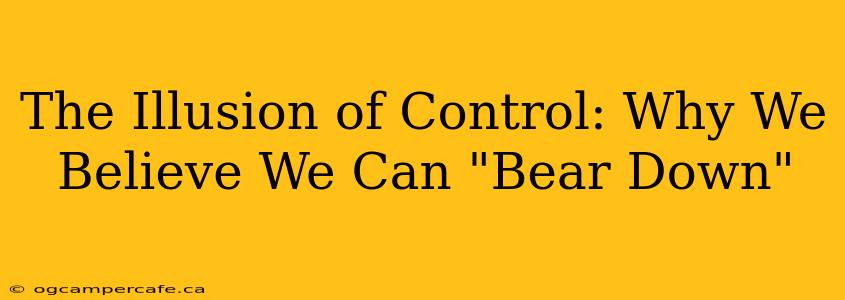We've all been there. Facing a looming deadline, a challenging task, or a stressful situation, we tell ourselves, "I just need to bear down and focus." We believe that sheer willpower, a focused effort, and intense concentration can overcome any obstacle. This belief in our ability to exert control, however, is often an illusion. While determination and hard work are undoubtedly important, understanding the limitations of our "bear down" mentality is crucial for effective productivity and mental well-being. This illusion of control stems from several cognitive biases and psychological factors.
What is the "Bear Down" Mentality?
The "bear down" mentality refers to the belief that we can overcome challenges through sheer willpower and intense focus. It's the feeling that we can push through exhaustion, stress, and even the limitations of our own cognitive abilities. It often involves a sense of urgency and a conviction that successful outcomes are solely dependent on our effort and determination. While a degree of grit and perseverance is essential for achievement, relying solely on this "bear down" approach can be detrimental.
Why Do We Believe We Can Always "Bear Down"?
Our belief in our ability to "bear down" is rooted in several psychological factors:
1. The Planning Fallacy:
This cognitive bias leads us to underestimate the time and resources required to complete a task. We optimistically assume everything will go smoothly, neglecting to account for potential setbacks, unexpected challenges, or simply the limitations of our own cognitive capacity. This overconfidence fuels the belief that we can just "bear down" and overcome any obstacle if we simply try hard enough.
2. The Illusion of Control:
This bias refers to our tendency to overestimate our control over events, even when our influence is minimal. We often believe that our actions directly determine outcomes, neglecting the role of chance, external factors, and unpredictable circumstances. This illusion leads us to believe that if we "bear down" hard enough, we can force a favorable outcome, regardless of reality.
3. Motivational Biases:
Our innate desire to succeed and avoid failure can distort our perception of our abilities. We tend to focus on past successes, overestimating our future performance and underestimating the difficulty of upcoming challenges. This motivational bias reinforces the belief that we can "bear down" and achieve anything we set our minds to.
4. The Dunning-Kruger Effect:
This cognitive bias suggests that individuals with low competence in a specific area tend to overestimate their abilities. Conversely, those with high competence often underestimate their skills. In the context of "bearing down," individuals might overestimate their ability to overcome challenges through sheer effort, especially if they lack the experience or knowledge to accurately assess the task's difficulty.
Can We Overcome Challenges Without "Bearing Down"?
While the "bear down" mentality can be helpful in short bursts, relying solely on it is unsustainable and can lead to burnout and decreased performance. A more effective approach involves:
- Realistic Planning: Accurately assess the task's complexity, allocate sufficient time and resources, and anticipate potential setbacks.
- Strategic Prioritization: Focus on the most important tasks and delegate or eliminate less critical ones.
- Effective Time Management Techniques: Employ methods such as the Pomodoro Technique or time blocking to optimize focus and avoid burnout.
- Self-Compassion: Acknowledge limitations, embrace imperfection, and practice self-care to prevent exhaustion.
- Seeking Support: Don't hesitate to ask for help when needed; collaboration and support can significantly enhance productivity and well-being.
Is "Bearing Down" Always Negative?
It's important to note that a degree of focused effort and determination is necessary for achieving goals. The key is to find a balance between persistent effort and realistic self-assessment. "Bearing down" can be a valuable tool when used strategically and in conjunction with other effective strategies. The danger lies in the illusion that it's a universally applicable solution to every challenge.
Conclusion: The Power of Balanced Effort
The "bear down" mentality, while seemingly empowering, often masks an illusion of control. Understanding the cognitive biases that fuel this belief allows us to develop a more balanced and sustainable approach to tackling challenges. By combining focused effort with realistic planning, effective time management, and self-compassion, we can achieve greater success and maintain our well-being in the process. The ability to recognize our limitations and adapt our strategies accordingly is far more effective than simply "bearing down" until we break.
